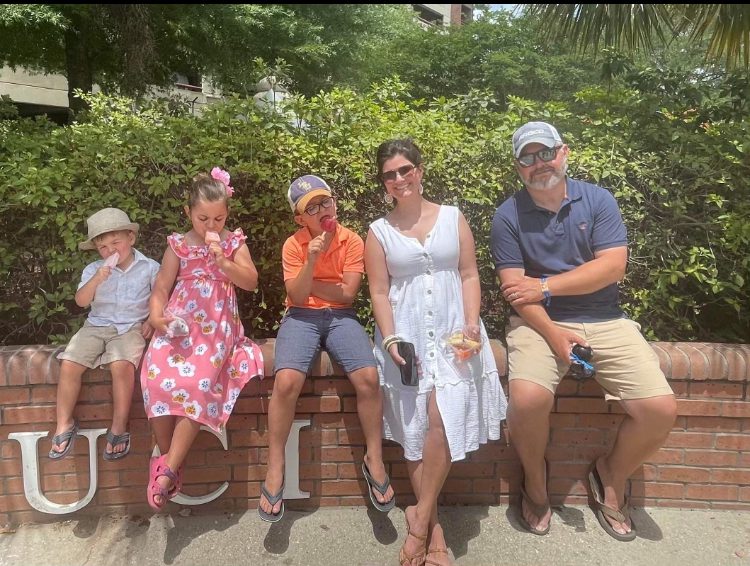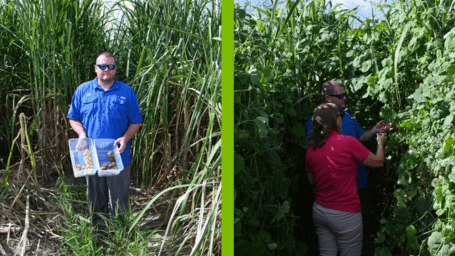The best way to learn is through direct hands-on experience, according to John Hebert, Ag Division manager at the Louisiana Sugarcane Cooperative mill near St. Martinville.
“If you want to really understand an occupation, walk in that field and get to know those people,” he said.
The cooperative, referred to as “LASUCA,” was built sometime in the 1850s and is owned by its over 350 member-growers and landowners who produce sugarcane on nearly 60,000 acres.
From old timers to new farmers putting in their first sugarcane crops, Hebert walks with LASUCA growers every step of the way for a successful planting and harvest each year.
“The most rewarding part of my job is troubleshooting to help farmers find solutions to problems and issues that arise,” he said. “It’s also a great feeling helping a first-time grower with things like variety selection, fertilizer recommendations and row spacing.”
Sugar is a passion and way of life for Hebert, who was born and raised on a sugarcane farm 12 miles from the LASUCA mill.
“My parents, Raymond and Terry, and my brother Josh are sugarcane growers, as were both my grandfathers, Philip Hebert Jr. and Russell Albert,” Hebert said. “Russell and my uncle Curry were both LASUCA members and served on the mill’s board of directors, and Philip served on the board of a neighboring mill.”
Hebert’s favorite childhood memories are of springtime on the farm.
“I loved being in the field and on the tractor when everything was emerging,” he said. “My favorite things are still those times when you see an immediate change in the field, such as when sugarcane is clipped in the spring. The dead leaves are removed to encourage new growth and it literally sprouts back overnight.”
After graduating from high school, Hebert attended Louisiana State University (LSU) in Baton Rouge.
“My intention was always to farm but it was also important to me to get a college degree,” he said.
While at LSU, Hebert worked in the soil testing laboratory for a few semesters as well as in the weed science department.
“I also did a lot of testing on cane farmers’ operations. I was able to talk to them and learn firsthand about what worked for them and what didn’t,” he said. “It was valuable real-life experience and hands-on application of what I was learning in the classroom, and I was able to use what I learned in plant pathology on the family farm.”
After graduating from LSU in 2005 with a Bachelor of Science degree in plant and soil sciences and a minor in agricultural economics, Hebert worked as a professional ag consultant for a few years.
“It was all about connecting knowledge to a problem and making connections between people who had the solution and people who needed the solution,” Hebert said. “It was the best feeling in the world when it succeeded.”
Knowledge and skills gained from these experiences enabled Hebert to effectively assist growers when he joined the team at LASUCA.
“There is a large diversity of sugarcane farming practices in southern Louisiana and even within our growing territory of nine parishes,” Hebert said. “Some of the vastly different cultural practices you’ll see across farms here include planting methods. Some farmers choose to plant the entire sugarcane stalk which is referred to as “whole stalk planting,” while others choose “billet planting,” a more mechanized method of planting small pieces of stalk. Some farms plant only by hand while other operations are completely mechanized.”
Advising farmers is just one of Hebert’s many roles as LASUCA’s Ag Division manager. Other responsibilities include managing the supply of sugarcane and setting delivery quotas, member relations between growers and mills, custom harvesting and operations, and legislative and legal affairs. He also organizes a fleet of 150 trucks that haul cane from the field to the mill, and helps oversee off-site properties including LASUCA Farm, the company’s own sugarcane growing operation started in 2010.
Hebert counts the recent factory-wide upgrade at LASUCA as one of his biggest career highlights to date.
“Starting in 2018, through the foresight and leadership of our general manager Mike Comb, we updated every single LASUCA department to handle an increasing supply of sugarcane,” he said. “The LASUCA mill was already one of the most advanced and automated in Louisiana and the project resulted in increasing our cane supply and processing capacity by 40 percent over the past six years.”
During the expansion project, nearly every step in the mill’s refining process was upgraded. Two new boilers were installed, and evaporators and cane handling equipment were fabricated.
“It was a huge group effort,” Hebert said. “The commitment and ability of LASUCA’s employees and its growers to plan and execute such a monster of a task was just phenomenal, and monumental as far as the industry is concerned.”

Although the decision to leave his family’s operation for a full-time ag career off the farm wasn’t easy, Hebe
rt said he has no regrets. Not only did he contribute to the success of his family’s farm, he also ensures the bright future of the American sugar industry every day by assisting Louisiana’s family farmers and getting new generations of sugarcane growers off to a solid start.
When not in the cane fields or at the mill, Hebert enjoys spending time with his wife Meghan, a registered dietitian, and their three children: daughter Irie, 8, and sons Kane, 5, and Jean-Philippe, 10. The family enjoys cooking, fishing, and entertaining together.










Get Social with #MoreToSugar